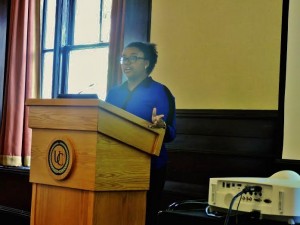On June 5, 2015, the University of Pittsburgh’s University Center for Social and Urban Research  (UCSUR) hosted its 6th Annual Neighborhood Information Users’ Conference at the University Club. UCSUR’s Program Director for Urban & Regional Analysis, Sabina Deitrick, welcomed approximately 75 people to the annual event before introducing our Community Data and Policy Fellow, Doni Crawford, who presented some of the findings from our Survey of Neighborhood Information. Doni focused on data constraints, data priorities and data needs of organizations around the city and region. Some data constraints for organizations included a lack of time to use data, a lack of technical skills on staff and the high cost of technology, software and other data tools. She also provided selected quotes from community organizations in order for attendees to hear what organizations want and need, as well as ponder how the community development system can ensure that organizations are accessing and using data more effectively.
(UCSUR) hosted its 6th Annual Neighborhood Information Users’ Conference at the University Club. UCSUR’s Program Director for Urban & Regional Analysis, Sabina Deitrick, welcomed approximately 75 people to the annual event before introducing our Community Data and Policy Fellow, Doni Crawford, who presented some of the findings from our Survey of Neighborhood Information. Doni focused on data constraints, data priorities and data needs of organizations around the city and region. Some data constraints for organizations included a lack of time to use data, a lack of technical skills on staff and the high cost of technology, software and other data tools. She also provided selected quotes from community organizations in order for attendees to hear what organizations want and need, as well as ponder how the community development system can ensure that organizations are accessing and using data more effectively.
Following Doni’s presentation, UCSUR Research Specialists, Bob Gradeck and Elizabeth Monk, launched the Southwestern Pennsylvania Community Profiles. This no-cost data tool provides a wealth of community data information at the county, county subdivision, census tract, block group,  neighborhood, zip code and County Council District levels. The SWPA Community Profiles currently contains eleven domains including: arts and culture, education, economy, housing and properties, public safety and transportation. The tool includes over 500 indicators from sources such as the U.S. Census Bureau, U.S. Bureau of Labor Statistics, The Home Mortgage Disclosure Act, The City of Pittsburgh, The Allegheny County Office of Property Assessments and the Allegheny County Department of Human Services. Community data is presented in a series of user-friendly interactive maps, tables and charts.
neighborhood, zip code and County Council District levels. The SWPA Community Profiles currently contains eleven domains including: arts and culture, education, economy, housing and properties, public safety and transportation. The tool includes over 500 indicators from sources such as the U.S. Census Bureau, U.S. Bureau of Labor Statistics, The Home Mortgage Disclosure Act, The City of Pittsburgh, The Allegheny County Office of Property Assessments and the Allegheny County Department of Human Services. Community data is presented in a series of user-friendly interactive maps, tables and charts.
After the launch of the SWPA Community Profiles, conference attendees participated in table discussions around current and future uses of data. The SWPA Community Profiles tool is not limited to current domains and indicators so the second table discussion included an opportunity for attendees to suggest indicators that can be added to the tool.
The Southwestern Pennsylvania Community Profiles tool is supported by the Allegheny County Department of Human Services Integrated Fund, UCSUR and PNC Bank. To explore the tool, see here: https://profiles.ucsur.pitt.edu/
For more information about signing up for SWPA Community Profiles tool trainings and suggesting additional indicators, contact UCSUR.
The SWPA Community Profiles will address community challenges with access, training, time and affordability of data. Neighborhood Allies is currently working with our partners to address additional community needs that arose in our survey such as the need for staff/capacity building, technology and data standardization. Stay tuned for our next steps!
